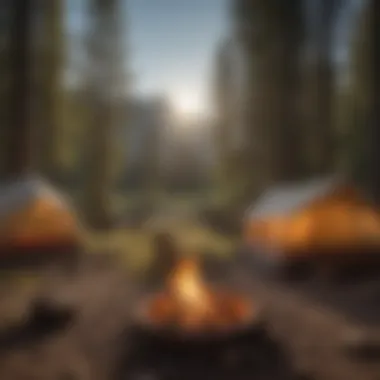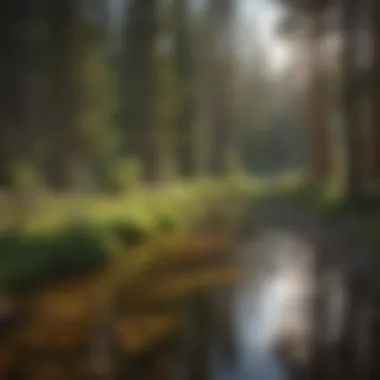Explore the Best Jackson Hole Campgrounds


Intro
Jackson Hole, known for its stunning landscapes and diverse recreational opportunities, draws a variety of camping enthusiasts each year. This article serves as a comprehensive resource, aiming to simplify the selection of campgrounds based on crucial factors such as amenities, locations, and user experiences. By scrutinizing both popular and lesser-known sites, we provide a platform for informed decision-making, enhancing one’s outdoor experience.
In this review, we will cover various aspects of the campgrounds in the Jackson Hole region. Users will find crucial insights into both widely favored spots and hidden gems that may not be on everyone’s radar. We will evaluate conditions based on visitor feedback, highlighting both exemplary features and areas needing improvement.
The analysis integrates practical information and critical assessments aimed at better equipping campers for their trips. It addresses common concerns raised by previous visitors, ultimately ensuring that our readers have a thorough understanding of their camping options.
Prolusion to Jackson Hole
Jackson Hole holds a special place in the hearts of many outdoor enthusiasts. This is not simply a geographical location but a hub for adventure and exploration. The area is surrounded by magnificent mountain ranges and rich wildlife, making it a prime spot for camping and other outdoor activities. Understanding Jackson Hole is essential for anyone interested in experiencing its unique camping culture and outdoor opportunities.
Overview of the Region
Jackson Hole is situated in northwestern Wyoming, a region that boasts stunning landscapes and diverse ecosystems. The Teton Range provides a dramatic backdrop to the valley, offering hikers, campers, and outdoor lovers numerous breathtaking views. The valley also contains the town of Jackson, known for its Western charm and access to various amenities. In addition, the region is part of several national parks, including Grand Teton National Park and parts of Yellowstone National Park, further enhancing its appeal.
Visitors are often drawn to Jackson Hole for its clear skies, abundant wildlife, and recreational opportunities available throughout the year. These attributes make it a perfect place for both seasoned campers and those new to the outdoor experience.
Significance in Outdoor Recreation
The significance of Jackson Hole in outdoor recreation cannot be overstated. This region serves as a playground for people interested in various activities. Camping is just one of the many pursuits available; others include hiking, fishing, and skiing during the winter months.
The accessibility of campgrounds contributes to the area's popularity. Each campground offers its own unique experiences, catering to different preferences and needs. Many are situated near lakes, rivers, or trails, enhancing the overall experience of connecting with nature.
Moreover, Jackson Hole's commitment to maintaining the environment helps sustain its outdoor activities. Conservation efforts ensure that natural resources remain available for future generations, emphasizing the importance of sustainable practices in camping and recreation. Outdoor recreation here is not just an activity; it is part of a lifestyle that embraces nature, exploration, and appreciation of the environment.
"In Jackson Hole, one does not just camp; one becomes part of a larger narrative of nature, adventure, and sustainability."
This intricate relationship between the region and its outdoor activities makes it vital for those planning to visit to understand what Jackson Hole has to offer.
Types of Campgrounds in Jackson Hole
Understanding the types of campgrounds in Jackson Hole is essential for those looking to immerse themselves in the natural splendor of this area. The region offers a range of camping environments, each with its own unique set of features and benefits. This variety caters to different camping preferences, whether one seeks solitude in nature or a family-friendly place with modern amenities. Analyzing these categories enables campers to make informed decisions based on their needs and expectations.
Public Campgrounds
Public campgrounds in Jackson Hole are primarily managed by government agencies, such as the National Park Service and the U.S. Forest Service. These sites are usually more affordable, attracting a diverse crowd looking for authentic outdoor experiences. Some notable public campgrounds include Jenny Lake Campground and Gros Ventre Campground.
- Access to Nature: Public campgrounds often boast close proximity to hiking trails, rivers, and wildlife viewing opportunities. The generally unspoiled landscape allows campers to connect profoundly with nature.
- Affordability: Entrance fees for public campgrounds are typically lower than their private counterparts. This aspect makes them accessible for budget-conscious campers who do not want to compromise on experience.
- Community Engagement: Campers in public sites often have opportunities to engage with fellow outdoor enthusiasts. Sharing experiences and stories is common, creating camaraderie among those who appreciate the outdoors.
- Regulation and Conservation: Public campgrounds are managed with a focus on conservation and minimizing impact on the environment, which aligns with the values of many nature lovers.
Overall, public campgrounds provide a wealth of experiences for visitors willing to explore the beauty of Jackson Hole at a reasonable cost.
Private Campgrounds
Private campgrounds in Jackson Hole offer a different flavor compared to public sites. These campgrounds range from rustic to luxurious and often provide additional amenities that may not be available in public locations. Examples of popular private campgrounds include Colter Bay Campground and Snake River RV Park.
- Enhanced Amenities: Private campgrounds frequently boast features like electricity, Wi-Fi, restrooms with showers, and recreational facilities. This makes them ideal for families or individuals looking for more comfort while camping.
- Variety of Accommodations: In addition to traditional tent sites, many private campgrounds offer cabins, RV sites, and yurts. This variety allows visitors to choose how they want to experience their stay based on preferences and comfort levels.
- Location Flexibility: Many private campgrounds are strategically located near key attractions such as Grand Teton National Park and Yellowstone National Park, making exploratory trips easier.
- Owner Management: Typically, private campgrounds are maintained by owners who invest in the overall experience of their guests. Good service and personal touches can enhance the stay significantly.
In summary, private campgrounds provide extra comfort and convenience for those seeking a more tailored outdoor experience in Jackson Hole.
Amenities Offered
Understanding the amenities offered by campgrounds is critical for any camping enthusiast. In Jackson Hole, these facilities can significantly enhance the overall experience for visitors. The availability of certain comforts can make a camping trip more enjoyable, convenient, and stress-free. Knowing what amenities are provided helps individuals make informed decisions that meet their specific needs.


Basic Amenities
The basic amenities found in Jackson Hole campgrounds typically include essential services that cater to most campers. These generally comprise:
- Restrooms: Clean and easily accessible restrooms are vital for ensuring comfort. Many campgrounds feature both flush toilets and vault toilets, depending on the location.
- Showers: For those staying longer, access to hot showers can be a welcome relief. Not all campgrounds provide this service, so checking beforehand is essential.
- Fire Rings and Picnic Tables: Having designated fire rings for campfires and picnic tables for meals enhances the outdoor experience. These features encourage gatherings and provide a communal atmosphere.
- Water Supply: Access to potable water is crucial. Campgrounds often have water spigots, but it is wise to confirm the availability and quality before arriving.
- Trash Disposal: Proper waste disposal facilities help maintain the cleanliness of the area. Campers must respect the environment by utilizing these services correctly.
Each of these basic amenities lays the groundwork for a pleasant camping experience. It is important for visitors to properly assess their needs when choosing a campground based on what basic amenities are available.
Unique Services
In addition to basic amenities, some campgrounds in Jackson Hole provide unique services that cater to various preferences and enhance the camping experience. These may include:
- Guided Tours and Activities: Certain campgrounds partner with local outfitters to offer guided fishing, hiking, and wildlife tours, which can enhance the connection with nature.
- Pet-Friendly Options: Many campers wish to bring their pets along. Campgrounds that welcome pets often provide specific amenities like dog parks or pet-friendly trails.
- Electric and Water Hookups: For RV campers, access to electric and water hookups can be a significant advantage. This service allows for a more comfortable stay, making it easier to use electronic devices and appliances.
- Camping Equipment Rentals: Some campgrounds offer equipment for rent, such as tents, sleeping gear, or kayaks. This service benefits those who may not have all the required gear or want to try something new without purchasing it.
- Wi-Fi Access: Though camping often means disconnecting, some campers still seek connectivity for work or planning. Wi-Fi at certain campgrounds provides the flexibility to balance nature and technology.
Understanding the range of amenities and unique services available is paramount for campers looking to tailor their experience to meet personal preferences. It enhances the overall joy and comfort of staying in the beautiful landscapes of Jackson Hole.
"Selecting a campground with suitable amenities can dramatically influence the quality of your outdoor experience. Prioritizing your needs ensures you enjoy your time in nature to the fullest."
Access and Location
The topic of Access and Location is crucial in understanding the camping experience in Jackson Hole. For outdoor enthusiasts, convenient access to campgrounds translates to more time spent enjoying nature rather than navigating complex routes. Campgrounds located near major roads facilitate quick getaway options for travelers. Additionally, safety must be a priority. Campgrounds that are well-maintained and easy to approach tend to provide a more secure environment for visitors.
Proximity to Major Attractions
Jackson Hole is renowned for its natural beauty and outdoor activities. Campgrounds that are close to major attractions like Grand Teton National Park and Yellowstone National Park allow for easy exploration of these iconic sites.
- Convenience: The shorter the distance, the more accessible hiking trails, scenic views, and recreational facilities become. This proximity leads campers to engage in more activities.
- Variety of Activities: Being near attractions means a variety of options. Whether it is hiking, fishing, or wildlife viewing, visitors can easily transition between camp life and adventure.
- Travel Efficiency: Less travel time means that visitors can optimize their schedules, fitting in extra activities. For families or groups with different interests, this is beneficial.
Accessibility for Different Vehicles
Accessibility for various types of vehicles is another important consideration. Campgrounds should accommodate not only standard cars but also larger vehicles like RVs and trailers.
- Road Conditions: Well-maintained access roads are essential. Campgrounds with gravel or dirt roads may present challenges for some vehicles, especially after inclement weather.
- Space Requirements: RV users, for instance, require specific space for parking and maneuvering. Not all campgrounds are designed to handle larger vehicles, which can limit options for these travelers.
- Amenities: A campground's ability to accommodate different vehicle types often correlates to the amenities offered. For example, campgrounds designed for RVs may provide electrical hookups or dump stations, enhancing the camping experience.
"The ease of access can significantly influence a camper's overall satisfaction with their trip. Proper planning regarding access and locations may enhance the experience and safety of outdoor activities."
Visitor Experiences and Reviews
Understanding visitor experiences and reviews is crucial for discerning the overall quality of camping options in Jackson Hole. Insights from those who have camped in the area can provide candid evaluations of facilities, site conditions, and the surrounding environment. The perspectives shared through reviews are often personal, reflecting real encounters that prospective campers might have. This information adds a layer of depth to the evaluation of campgrounds, moving beyond mere descriptions of amenities or locations.
Visitor feedback serves several functions. Firstly, it highlights the unique features that differentiate various campgrounds. Certain visitors may appreciate proximity to hiking trails, while others might prioritize quietness or family friendliness. Secondly, these reviews can caution potential campers against pitfalls that may not be apparent from official descriptions. A place might sound idyllic, but firsthand accounts can reveal issues like poor maintenance or unsatisfactory staff behavior.
Essentially, visitor experiences offer a practical lens through which to view camping in Jackson Hole. These reviews contribute to making informed choices, thus enriching one’s overall outdoor experience.
Positive Feedback
Positive reviews often reflect satisfaction with various aspects of the camping experience. Many visitors praise the natural beauty surrounding the campgrounds. The stunning views, lush forests, and proximity to wildlife resonate deeply with outdoor enthusiasts. Access to activities such as fishing, hiking, and wildlife photography is also a significant highlight.
Many visitors also comment on the friendly atmosphere of the campgrounds. A sense of community often develops among campers, fostering a welcoming environment. Families appreciate amenities that cater to children, like playgrounds and organized activities, which help keep younger visitors occupied and entertained.
Other aspects that receive accolades include:
- Well-maintained facilities, including restrooms and showers.
- Availability of fire pits and picnic tables.
- Knowledgeable campground hosts who provide valuable local insights.


These elements contribute to a memorable camping trip, making positive reviews an essential part of the evaluation process for potential visitors.
Common Complaints
While many reviews are favorable, it is equally important to consider common complaints that arise from visitors’ experiences. One frequent issue reported is overcrowding, especially during peak seasons. This often results in reserved sites being less than ideal, detracting from the intended outdoor experience.
Another common complaint pertains to cleanliness. Various reviewers note that some campgrounds could benefit from improved maintenance. Issues such as overflowing trash bins or poorly maintained restroom facilities can significantly impact visitor satisfaction.
Some complaints include:
- Noise disturbances from nearby roads or other campers.
- Limited availability of essential amenities, such as potable water.
- Booking difficulties, particularly during busy periods.
Addressing these complaints can enhance future visitor experiences and is essential for campground operators to consider as they look to improve their services.
Environmental Considerations
Understanding environmental considerations is crucial for the camping experience in Jackson Hole. The region's unique ecosystem provides numerous opportunities for outdoor enthusiasts but also demands responsible behaviors to protect its natural resources. As travelers navigate these beautiful landscapes, they encounter diverse wildlife and fragile environments, making awareness of best practices essential.
Wildlife Interaction
Wildlife interaction can greatly enhance the camping experience, adding an element of excitement and natural beauty. However, it is essential to approach such encounters with caution and respect.
Many species, including elk, deer, and even bears, inhabit the area. Campers must learn about the proper etiquette for wildlife encounters to ensure both their safety and the animals' well-being. Key points include:
- Food Storage: Properly storing food is one of the most significant measures campers can take. Hang food in bear-resistant lockers or use bear bags to avoid attracting wildlife to campsites.
- Observation: Observing wildlife from a safe distance is important. Close interactions can stress animals, leading to dangerous situations for both parties.
- Education: Understanding local wildlife can enrich the camping experience. Familiarize oneself with the behaviors and habits of species found in Jackson Hole through resources like Wikipedia or local wildlife guides.
By adhering to these guidelines, campers can enjoy the thrill of wildlife observation without compromising their safety or that of the animals.
Sustainable Camping Practices
Adopting sustainable camping practices benefits the environment and enhances the experience for all visitors. These practices help preserve the pristine conditions of Jackson Hole, allowing future generations to enjoy it.
Essential sustainable practices include:
- Leave No Trace Principles: This set of principles encourages campers to minimize their impact. This includes cleaning up after oneself, packing out all trash, and staying on designated trails to prevent damaging vegetation.
- Use of Eco-Friendly Products: Campers should consider using biodegradable soaps, eco-friendly toilet paper, and non-toxic bug sprays. These choices reduce the environmental footprint on the natural ecosystem.
- Waste Management: Proper disposal of waste significantly impacts the area. Utilize provided facilities to properly dispose of human waste and trash, preventing pollution and protecting wildlife.
By focusing on sustainable habits, campers contribute to the health of the environment and ensure that Jackson Hole remains a breathtaking place for outdoor activities.
"Sustainable camping practices are not just about conservation but also about preserving the enjoyment of nature for future enthusiasts."
Less-Known Campgrounds
Exploring less-known campgrounds in Jackson Hole can provide a markedly different experience compared to the popular sites. These hidden locations often offer a sense of solitude and connection to nature that is sometimes hard to find in more frequented areas. The importance of recognizing these campgrounds is not only linked to the reduction of overcrowding at popular sites but also to the opportunity they present for unique outdoor experiences.
When camping at lesser-known spots, one might find untouched landscapes and fewer disturbances. This can lead to a more authentic interaction with the surrounding environment. For many camping enthusiasts, the pursuit of tranquility in nature is a top priority. Less-known campgrounds usually come equipped with basic amenities, making them favorable for those who prioritize simplicity over luxury.
Hidden Gems
In the realm of Jackson Hole's hidden gems, several campsites stand out. These locations might not be marketed widely, but they boast distinctive features that make them worth a visit.
- Name of Hidden Campground 1: This remote site is valued for its serene lake views. The calm waters provide a perfect reflection of the surrounding mountains.
- Name of Hidden Campground 2: Nestled in a lesser-traveled side of the valley, this campground offers incredible hiking trails. Adventurous visitors can explore various paths leading to scenic overlooks.
- Name of Hidden Campground 3: Surrounded by dense forest, this site promises privacy. Campers can hear the soft rustle of leaves, creating a soothing backdrop for relaxation.
Each of these hidden gems provides opportunities for wildlife viewing and stargazing. The fewer campers also mean less light pollution.


Reasons to Explore Alternative Options
Assessing less-known campgrounds can be crucial for a variety of reasons:
- Avoiding Crowds: Major campgrounds can be crowded, particularly in the peak season. Lesser-known sites present an escape from this pressure, allowing for a more peaceful experience.
- Experiencing Authenticity: Often, these sites retain a rustic charm. The simple setting can enhance the camping experience, giving visitors a chance to unplug and unwind.
- Connect with Nature: With fewer people around, wildlife interactions might be more frequent. Campers have a higher chance of observing different species without the usual disturbances from large crowds.
- Discover Local Culture: Visiting less-known areas can also lead to learning about local traditions. Engaging with the community around these hidden spots often reveals a wealth of knowledge about the region.
"Choosing to camp in less touristy areas often yields remarkable memories and adventures that are unique to each visitor."
By actively seeking out these alternative camping options, visitors can enrich their Jackson Hole experience substantially. It is indeed important to understand the landscape around these hidden campgrounds. Choosing to explore them can lead to profound insights about sustainability and conservation within the region.
Future of Camping in Jackson Hole
As the landscape of outdoor recreation evolves, understanding the future of camping in Jackson Hole becomes essential. The area is renowned for its stunning natural beauty and diverse ecosystems. However, increased visitation and environmental concerns require a closer examination of trends and challenges.
Trends in Camping
The camping experience in Jackson Hole is changing, largely driven by shifts in societal behavior and preferences. A few notable trends include:
- Rise of Glamping: Many campers are moving towards glamping, or glamorous camping, which combines the experience of nature with the comforts of modern amenities. This trend attracts individuals who prefer a more luxurious experience while still enjoying the great outdoors.
- Technological Integration: There is an increasing use of technology in camping, such as apps for booking campsites and locating nearby recreational amenities. This trend enhances the overall camping experience by making information more accessible.
- Sustainability Focus: Campers are becoming more conscious of their environmental impact. Many seek out campgrounds that prioritize eco-friendly practices and offer sustainable amenities. This trend reflects a growing awareness about conservation and responsible recreation.
These trends indicate a shift that can affect campground management and the types of services they offer, as well as the overall camping culture in Jackson Hole.
Potential Challenges
Despite the positive trends, the future of camping in Jackson Hole presents several challenges that need to be addressed:
- Overcrowding: With the continuous rise in the popularity of the area, overcrowding at popular campgrounds may lead to diminished experiences. Sustaining the area's natural beauty while accommodating increasing numbers of visitors is a critical concern.
- Environmental Degradation: Increased use can lead to soil erosion, damage to vegetation, and disruption to wildlife. Ensuring the preservation of the ecosystem while catering to camper demands poses a significant challenge for management.
- Resource Allocation: The demand for camping in Jackson Hole may necessitate changes in resource allocation. Balancing profits with conservation efforts is vital but difficult to achieve.
Solutions to these challenges must prioritize long-term sustainability and education for visitors. Collaboration among local authorities, campground operators, and outdoor enthusiasts will be crucial for ensuring a promising future for camping in this iconic region.
"A thoughtful approach will not only preserve the environment but also enrich the experience for future generations of campers."
The upcoming years will require adaptability and a commitment to addressing these challenges, ensuring that camping in Jackson Hole remains a cherished and sustainable endeavor.
Ending
The conclusion serves as a crucial element of this article, providing a synthesis of the information discussed throughout the sections. Understanding the various campgrounds in Jackson Hole is vital for both seasoned campers and newcomers. By summarizing the key insights, readers can make informed decisions about where to camp based on their preferences, needs, and environmental considerations.
Camping in Jackson Hole offers diverse experiences. From public parks such as Grand Teton National Park to private setups with added amenities, there is something to suit every taste. The accessibility of the campgrounds to major attractions enhances their appeal, enabling visitors to fully immerse themselves in the natural beauty of the area.
Additionally, this section highlights essential considerations regarding visitor experience, wildlife interactions, and sustainable practices. Forethought in selecting a campground can greatly impact enjoyment and safety, making this conclusion more than just a wrap-up. It urges readers to reflect on their camping style and choose accordingly.
Summary of Key Points
- Diversity of Campgrounds: There are multiple options, both public and private, catering to various needs.
- Accessibility: Most campgrounds are conveniently located near popular attractions like Grand Teton and Yellowstone.
- Amenities Offered: Varies widely; some are basic, while others provide unique services including guided tours and equipment rentals.
- Visitor Experiences: Positive feedback highlights the natural surroundings, while common complaints often mention overcrowding and varying facility conditions.
- Environmental Considerations: Emphasizes the importance of sustainable practices and respectful wildlife interactions.
Final Thoughts on Camping in Jackson Hole
Camping in Jackson Hole is not merely an outdoor activity; it is an opportunity to engage with nature and appreciate the region's exceptional environment. The insights gained from this article can serve as a foundational guide for planning a successful camping trip.
Although the area boasts numerous well-known campgrounds, exploring less-traveled paths can lead to enriching experiences off the beaten track. Proper preparation and attention to environmental considerations can enhance enjoyment for all who visit.
As camping evolves, being aware of trends and potential challenges can help protect the essence of this meaningful activity. Professionals and academics interested in outdoor recreation can find value in understanding these dynamics to promote responsible camping practices.
"Engaging with nature through camping fosters a deeper appreciation for the environment while encouraging sustainable practices among visitors."
For those looking to delve deeper or share experiences, forums such as Reddit provide rich community insights, while additional information can be found on platforms like Wikipedia or Britannica.
Equipped with the right knowledge, campers can enjoy all that Jackson Hole has to offer, creating lasting memories in one of the most stunning outdoor settings.















